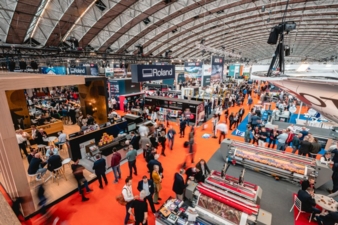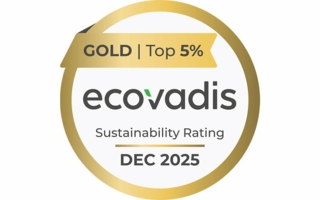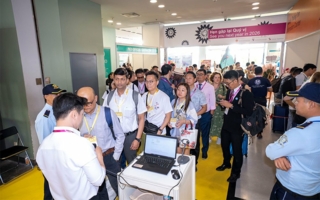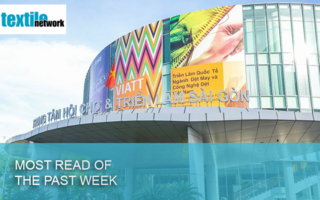22/04/2025 – Personalisation Experience 2025
The power of personalisation
In today’s marketplace, there is a plethora of personalised products and items available to consumers. The personalised element of these products adds significant value to customers. In addition, it’s hard to ignore the growth in this market over the last decade, driven by the advent of digital print technology and the ability to handle variable data.
Thanks to advancements in technology, demand for personalised products is increasing. Businesses that don’t incorporate any elements of personalisation into their product offering could risk losing revenue and customer loyalty[1]; especially as Deloitte research shows that in some categories, more than 50% of consumers expressed interest in purchasing personalised products or services[2]. In addition, one in five consumers is willing to pay a 20% premium for personalised products or services[3]. And, 78% of consumers are more likely to repurchase from companies that personalise their offering[4], so it seems personalisation is integral to building brand loyalty. Personalisation involves understanding a person’s preferences and characteristics, so reflecting this within a product or item reinforces a sense of belonging while building loyalty to a specific brand. Ultimately, personalisation provides a deeper, more emotional connection than perhaps a non-personalised product would. On top of that, 71% of customers recommend a brand because they have an emotional connection to it[5]. So, for brands, personalisation and building strong connections is a route to tap into a new audience, something which Neil Reynolds, NFL Presenter at Sky Sports, discussed the importance of at last year’s Personalisation Experience. During his session Neil talked about how he is working on a personalised children’s book about the NFL with the aim of introducing the game to a younger audience. Providing a personalised touchpoint with a brand can make customers feel special and help to build a long-lasting relationship.
From packaging to sportswear
Let’s look back 14 years to 2011, when the Share a Coke campaign launched, which is probably one of the most recognised large-scale examples of customised packaging. By using everyday names on its bottles, the campaign resonated with people across the globe and showed that personalisation could be used beyond just special events and indeed, as part of everyday products and packaging.
Today, there are numerous food and beverage brands using personalisation to build loyalty and relationships with customers. Tony’s Chocolonely, for instance, allows customers to create customised chocolate bar wrappers on its website, where they can upload pictures to the wrapper, and choose the design and text. M&M’s on the other hand lets customers personalise the chocolates with a choice of text or design. The apparel industry is also a big market for customisation, be it clothing, hats and other accessories. For a number of years, customers have been able to order personalised garments online from web-to-print companies, where they can choose the image and/or text to be added to a piece of clothing. Historically, these items have largely been used to support certain events (for example, corporate or sports events). However, with advancements in technology and demand for customised clothing, to fuel a person’s expression for individualism, personalised apparel has gone one step further. For example, brands such as Nike are enabling customers to create one-off pieces of footwear, as well as a range of other items, with select stores offering on-the-spot in-store customisation. A large segment of the custom apparel market is sports shirts with major brands using heat-transfer digital printing for customising sportswear/designs. In 2024, the global custom t-shirt printing market (including sports shirts) was valued at $5.16billion[6] representing a major opportunity for brands.
And it’s not just clothing within sports that’s a big area for customisation, if you attend any large sporting event nowadays – across the world – you can see an abundance of customised banners and flags with many stadiums also offering on-site printing of personalised banners for fans.
We’ve only just scratched the surface of the opportunities and examples of personalisation that exist today and with the continuous developments in digital print technology, this trend is only going to grow and open up even more opportunities and customer touchpoints with brands.
[1] The Deloitte Consumer Review Made-to-order: The rise of mass personalisation
[2] The Deloitte Consumer Review Made-to-order: The rise of mass personalisation
[3] The value of getting personalisation right – or wrong – is multiplying: https://www.mckinsey.com/capabilities/growth-marketing-and-sales/our-insights/the-value-of-getting-personalization-5 right-or-wrong-is-multiplying?utm_source=chatgpt.com
[4] The value of getting personalisation right—or wrong—is multiplying: https://www.mckinsey.com/capabilities/growth-marketing-and-sales/our-insights/the-value-of-getting-personalization-right-or-wrong-is-multiplying?utm_source=chatgpt.com
[5] Blogging Lift: 22 Emotional Marketing Statistics (2025): New Stats & Data
[6] Grand View Research: https://www.grandviewresearch.com/industry-analysis/custom-t-shirt-printing-market
If you are interested in personalisation, then you won’t want to miss Personalisation Experience 2025, which will take place at Messe Berlin, Germany from 6 to 9 May 2025. At the event you will be able to engage with a wide range of exhibitors showcasing the latest technologies for producing customised products, including: digital printing, variable data printing, heat-transfer printing, laser engraving, 3D printing and software solutions. You will also have access to the free personalisation Smart Hub conference sessions that will run across all four days of the event. The sessions will cover hot topics within the industry including AI, automation and sustainability, as well as printer and customer case studies. In addition, the Smart Factory feature will highlight the latest on-demand technologies with live demonstration tours showcasing how customised products are designed, printed and produced across a range of different products.
For more information please visit: www.personalisationexperience.com.





